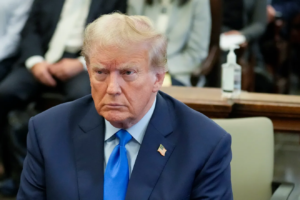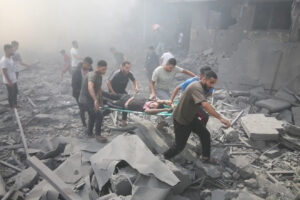Recent developments in the ongoing conflict between Ukraine and Russia have once again thrust the region into the international spotlight. In the latest round of hostilities, Ukrainian forces are striving to hold back Russian advances, particularly in and around the strategically vital city of Avdiivka. This resurgence of fighting comes in the wake of the Kremlin’s launch of its most substantial military offensive in months. Here, we delve into the unfolding situation, the significance of Avdiivka, and international reactions to the conflict.

Anadolu Agency | Anadolu Agency | Getty Images
Ukrainian Forces’ Efforts in Avdiivka
Amid the renewed hostilities, Andriy Yermak, the Ukrainian president’s chief of staff, has reported that Ukrainian forces are engaged in heavy fighting as they strive to maintain their positions. President Volodymyr Zelenskyy has expressed his gratitude to every warrior and unit involved in these intensifying battles. The city of Avdiivka holds immense strategic importance as it is considered the gateway to Donetsk, the capital of the eastern Donbas region.
Read more: Biden Commends Kaiser Permanente Labor Deal Following Worker Strike
Casualties and Humanitarian Concerns
The resumption of conflict has already had dire consequences. Ukraine’s state emergency services reported that one person was killed, and 12 others sustained injuries in a Russian attack on the eastern city of Pokrovsk. As hostilities persist and intensify, the humanitarian situation in the region continues to deteriorate. The well-being of the civilian population remains a significant concern, with displacement, injuries, and loss of life increasing.
Putin’s Comparisons to Leningrad Siege
Russian President Vladimir Putin recently drew historical parallels when speaking at the summit of the Commonwealth of Independent States (CIS) in Kyrgyzstan. He likened the situation in Gaza to the infamous Leningrad siege during World War II. The Leningrad siege was a devastating chapter in history, lasting nearly two and a half years and resulting in the deaths of over a million residents due to hunger and military bombardment.
Putin’s comments emphasized Israel’s right to ensure its security but also called for a resolution to the current crisis. These remarks shed light on Russia’s stance on the conflict and its commitment to seeking a diplomatic solution. Furthermore, Putin addressed the issue of weapons, suggesting that arms could be transferred from Ukraine to Hamas, although no concrete evidence has been presented to substantiate this claim.
Read more: Israel’s Border Security Concerns Mount with Ongoing Assaults from Various Directions
Analysis of Putin’s Comments
Putin’s comparison of Gaza to the Leningrad siege serves to underscore the gravity of the conflict in his view. By evoking the historical tragedy of Leningrad, he highlights the dire humanitarian situation in Gaza and the urgency of addressing the crisis. His acknowledgment of Israel’s security concerns also signals Russia’s balanced approach to the conflict.
The reference to weapons and the potential for their transfer from Ukraine to Hamas raises questions about the origin of arms used by the militant group. While Putin suggests the possibility of weapons entering the black market and subsequently reaching Hamas, Ukrainian officials have refuted such claims. This aspect of the conflict highlights the complexity of the situation and the need for rigorous verification of information.
In conclusion, the resumption of hostilities near Avdiivka and the recent statements by President Putin demonstrate the evolving dynamics of the Ukraine-Russia conflict. As the international community monitors the situation closely, the focus remains on finding a path toward a peaceful resolution and mitigating the humanitarian impact on the civilian population. The historical analogies drawn by Putin underscore the urgency of addressing the crisis and preventing further escalation.



